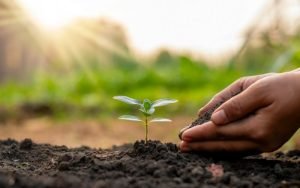Gardening is not just a hobby; it is an activity that connects you with the environment, gives you peace, and turns your compound into a green, vibrant natural oasis. We have written a detailed article on gardening for health; feel free to check it out. In this article we will focus more on improving the way your garden looks and your plants grow.
Regardless of your level of expertise, having the right gardening tips and ideas is crucial. Applying effective gardening techniques can greatly enhance both the productivity and beauty of your garden. For example, approaches like enriching the soil and using eco-friendly remedies will enable you to create a flourishing and stunning place.
Let’s discuss some of these clever gardening tips and tricks and understand how they can beautify your outdoor space.
General Gardening Tips
Start with Quality Soil

The foundation of any garden begins with the quality of the soil. Ideal soil should be rich, well-drained, and light. To ensure your plants thrive, begin by enriching your soil with high-quality compost and natural fertilizers. This practice supplies essential nutrients and improves soil structure. Whether you’re gardening cucumbers, tomatoes, or other fruits and vegetables, composting will enrich your plants for robust growth and fruit production.
Use Companion Planting

Companion planting involves growing different plants together that benefit each other. For instance, planting marigolds near tomatoes can deter harmful pests, thus boosting their growth. Similarly, placing basil next to tomatoes can enhance their flavor and overall health. This technique not only increases your garden’s yield but also promotes natural pest control, minimizing the need for synthetic chemicals.
DIY Rain Barrels

Installing a rain barrel system is a practical and cost-effective way to conserve water. Rain barrels collect runoff from your roof, which can be used to water your garden during dry periods. This eco-friendly method ensures you have a sustainable water source. To build a rain barrel, use a large container with a spigot at the bottom, position it under a downspout, and fit a mesh cover to prevent debris from entering.
Epsom Salt for Healthier Plants
Epsom salt is a natural remedy that can enhance plant health. Rich in magnesium, it supports chlorophyll production and overall plant vitality. Sprinkle a small amount of Epsom salt around plants that require additional magnesium, such as cucumbers and tomatoes. Regular use, ideally once a week, can lead to healthier, more vibrant plants and improve growth and fruit production.
The Epsom salt method works well in plant species that require additional magnesium, particularly in instances where cucumbers and tomatoes are to be cultivated. Applying Epsom salt is recommended at least once a week, and it results in a healthier and more beautiful cucumber plant, as some cucumber gardening tips suggest.
Get Epsom salt for gardening today!
Strategic Mulching
Mulching is an essential practice in gardening with numerous benefits. Applying a layer of mulch around your plants helps retain soil moisture, regulate temperature, and suppress weeds.
Organic mulches like straw, wood chips, and compost enhance soil health and give garden beds a tidy appearance. Mulching reduces evaporation and controls weed growth, ensuring plants receive a consistent supply of moisture and nutrients.
You can either make your own mulch or buy it online:
Upcycled Garden Art

Repurposing old items into garden art is a fun trick many people use to add character to their gardens.An old bicycle wheel can be transformed into a unique trellis, while mismatched teacups can serve as charming planters. Upcycling beautifies your garden and reduces waste. Be creative and turn scraps into beautiful and functional accessories in the garden that echo your personality.
DIY Drip Irrigation

A custom drip irrigation system is an effective and economical solution for watering your garden. Instead of using expensive pipes and hoses, opt for inexpensive PVC pipes and hoses. This system delivers water directly to the roots of your plants, reducing water waste and ensuring a steady, controlled water supply. DIY drip irrigation is particularly useful for gardens with varied plant needs or in water-scarce areas.
Raised Garden Beds

Raised garden beds are a practical solution for improving soil conditions and making gardening more accessible. These elevated beds provide better drainage, reduce soil compaction, and are easier to tend to, especially for those with mobility issues. You can construct raised beds from materials like wood, bricks, or stone to create a visually appealing and functional garden feature. Raised beds also help extend the growing season by warming up faster in the spring and cooling down more slowly in the fall.
Herb Spiral Gardens
Herb spiral gardens are among the creative solutions that can allow planting a great number of herbs at the same time in a limited territory. This type of garden structure allows for the changing conditions of the plants to exist as they are set vertically in the spiral.
Different plants require different amounts of light and water, so herb spirals can be both beautiful and practical for any garden. Herb spirals are aesthetically pleasing and convenient for adding herbs to meals. They symbolize advanced techniques of horticultural design, make the most of the available area, and incorporate the best possible look.
Indoor Gardening Tips
Container gardening is one of the best options if you have a small area or an unfavorable climate in the yard. Having potted flowers, herbs, or vegetables allows you to garden year-round.
Note: Your indoor garden should be exposed to sufficient light, either from natural or artificial sources, and proper aeration and humidity should also be maintained.
Indoor gardening provides an opportunity to make an interior as close to nature as possible by improving the quality of fresh air.
Vertical Gardening

When space is limited, vertical gardening is an excellent solution. Using planters, trellises, or wall-hung baskets, you can grow tomatoes, cucumbers, and beans effectively. This method optimises space and adds personality to your garden, making it perfect for compact or urban areas.
Smart Gardening Apps: Tips and Tricks
Gardening can thus benefit significantly from technology as a tool to help gardeners. Available apps for gardeners provide tools such as a planting calendar, weather notifications, and timelines of the required maintenance.
These apps also offer a function for suggesting bonus plants based on your location and maintaining your garden healthy and productive. Whether you are new to gardening or an expert, these digital aids will help you run your garden easily and enhance your gardening practices.
Note: Below are some highly recommended Smart Gardening Apps:
Organic Gardening Tips
Composting for Organic Gardening

Composting is a key part of gardening with organic manure. It involves using kitchen scraps, leaves, and twigs as a carbon source. As these materials break down, they become nutrient-rich compost, which greatly improves soil health.
To make a compost pile, use a garbage can or create one with chicken wire. Turn the compost regularly to provide the needed oxygen. This process recycles organic waste, reduces garbage, enriches the soil, and is eco-friendly.
Natural Fertilizers for Organic Gardening

Natural fertilizers are essential for an organic garden. Instead of synthetic fertilizers, you can use compost, manure, or fish emulsion to nourish your plants. These natural options help improve soil health and are better for the environment. You need to choose the right type of fertilizer for your plants and monitor their growth to ensure they get the nutrients they need. Using organic manure is a key part of organic gardening.
Organic Pest Control Methods

Organic pest control involves other methods besides the administration of synthetic compounds.
These methods for pest infestations are friendly to the environment and enhance the balance of biodiversity in your garden. These are some of the organic pest control techniques that are vital elements in organic gardening suggestions.
Crop Rotation for Organic Gardening

Crop rotation is essential in farming because it reduces the chances of diseases and enhances the quality of the soil. By changing the crops planted in a given area, they can avoid the building up of soil and pests on the crops grown. You can tend to the arrangement of your plant families by rotating them so that they can be in a new area every season to allow the soil replenishment and home a healthy garden environment. Crop rotation is one of the helpful elements of caring for the organic garden for the proper functioning of the garden throughout the years.
Conclusion
Gardening is one of the most satisfying activities one could ever indulge in, as it enriches the soil of the earth as well as the hearts of the gardener. The following 15 clever gardening tips and tricks will help you improve your gardening strategies and techniques, and your garden will become more beautiful and healthy.
These tips will help enhance soil fertility, utilize environmentally friendly products in lawn care, find ideas for making good use of wasted products, and devise unique ways of watering our gardens. Let us use the right tools, adopt these techniques, and enjoy the virtues and satisfaction of developing a piece of paradise regardless of one’s plot size.
























